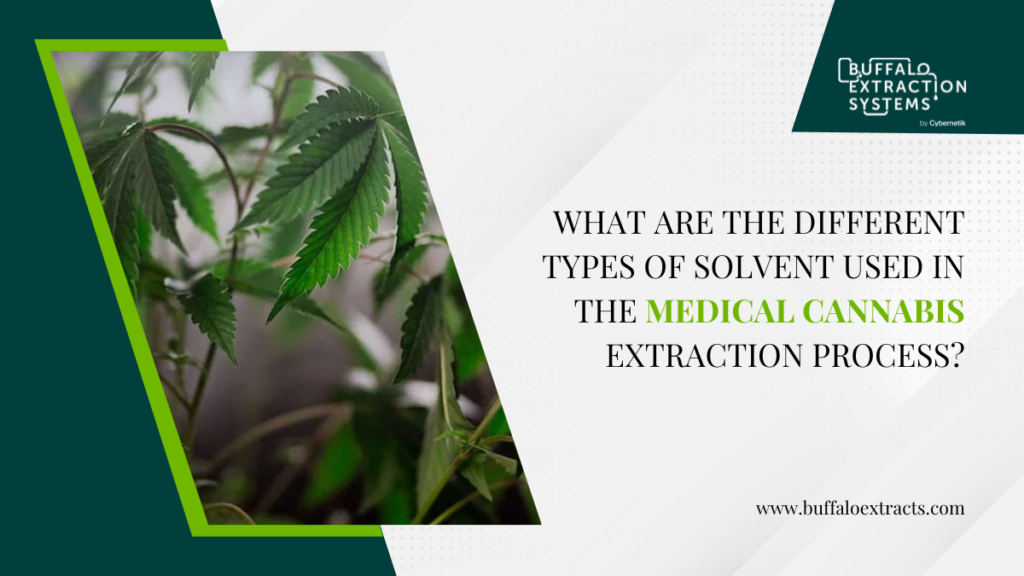Exploration of Solvent Types in Cannabis Extraction Process
Why is the question viz. “what are the different types of solvent used in the medical cannabis extraction process” so important? That’s because solvents influence the quality of the extract, and quality is supremely important in the medical world. Before we get into details, we must mention the precision of CO2 extraction for essential oils stands out for its ability to target specific compounds, while the efficiency of hydrocarbons, such as butane and propane, allows for high concentrations of cannabinoids, particularly in popular cannabis concentrates.
The choice of solvent emerges as a central factor influencing the therapeutic profile of medical cannabis products. The present exploration ventures into the diverse world of solvents utilized in the extraction process, shedding light on their distinct advantages, considerations, and the profound impact they have on the ever-expanding landscape of medicinal cannabis formulations.
Understanding these solvents is integral not only for manufacturers crafting precise formulations but also for consumers seeking purer ingredients in their medical cannabis. Here is an answer to what are the different types of solvent used in the medical cannabis extraction process:

- CO2 (Carbon Dioxide)
Description: CO2 extraction involves using carbon dioxide in its supercritical state, where it exhibits the properties of both liquid and gas.
Advantages It’s considered safe, efficient, and leaves behind no residues. CO2 is tunable, allowing extraction of specific compounds by adjusting temperature and pressure. And because the critical temperature of CO2 is 31.1 deg-C that is near the room temperature, the process temperature of supercritical fluid extraction (SCFE) using CO2 is low. This prevents distortion of heat sensitive cannabinoids. Besides, if CO2 is recirculated, it does not cause any environmental harm.
Considerations Equipment costs can be high, and the process requires expertise to optimize.
- Ethanol
Description: Ethanol, a type of alcohol, is a popular choice for cannabis extraction done by cannabis ethanol extraction systems due to its ability to dissolve a wide range of compounds.
Advantages: Ethanol is relatively safe, cost-effective, and can be used at various temperatures. It also extracts a broad spectrum of cannabinoids and terpenes.
Considerations: Residual solvent removal is crucial, and the process may extract undesired chlorophyll, requiring additional refinement steps. Post extraction can take a heavy toll on your resources – time, effort, and money. Minimizing the use of these always helps.
- Butane
Description: Butane is a hydrocarbon that is highly effective at extracting cannabinoids and terpenes from cannabis.
Advantages: Butane extraction is efficient and yields a high concentration of cannabinoids. It is widely used for producing cannabis concentrates such as shatter and wax.
Considerations: Butane is flammable, requiring careful handling. Additionally, thorough purging is necessary to eliminate residual solvents. As mentioned, post extraction processing can cost a fortune in terms of time, effort, and funds.
- Propane
Description: Propane is another hydrocarbon, and is similar to butane in its extraction capabilities but with some differences in its properties.
Advantages: Propane can be more selective in extracting cannabinoids and terpenes, and it has a lower boiling point than butane, which can be beneficial in purging.
Considerations: Similar to butane, propane is flammable and requires meticulous purging to ensure product safety.
- Hydrocarbons (Mixed)
Description: Some extraction processes use a mixture of hydrocarbons, often a blend of butane and propane, to take advantage of their different properties.
Advantages: This approach aims to combine the strengths of both butane and propane for a more tailored extraction process.
Considerations: Safety precautions and thorough purging remain essential when working with hydrocarbon mixtures.
- Olive Oil
Description: Olive oil is a non-toxic, safe solvent that has been traditionally used for home-based cannabis extractions.
Advantages: The solvent is safe, readily available, and requires no specialized equipment. Olive oil extraction is suitable for producing infused edibles.
Considerations: The resulting product may be less concentrated than those obtained through other methods, and it requires careful storage to prevent spoilage.
- Isopropyl Alcohol
Description: Isopropyl alcohol is a solvent that is sometimes used for cannabis extraction, especially in do it yourself (DIY) settings.
Advantages:It is affordable and accessible. However, it requires careful purging to eliminate any residual alcohol.
Considerations: Isopropyl alcohol is not safe for consumption, making it less suitable for producing products intended for ingestion.
Finally
In medical cannabis extraction, selecting the right solvent is a nuanced process that balances efficacy, safety, and desired outcomes. Solvents such as CO2, ethanol, and hydrocarbons each contribute unique attributes, providing manufacturers with multiple options for creating as well as refining formulations.
As the industry continues to evolve, a crucial emphasis on safety and sustainability persists. Researchers are actively pursuing green technologies, seeking solvents that minimize environmental impact and enhance overall industry sustainability. With rigorous testing and quality control measures, the commitment to safety ensures that cannabis products meet the highest standards. The continual refinement of extraction techniques not only reflects the growth of the medical cannabis sector but also points toward a future where advancements in extraction contribute significantly to the industry’s maturity and the delivery of high-quality medicinal products.
It is within this broader context that we should reexamine the question of what are the different types of solvent used in the medical cannabis extraction process? If cost is not a limiting factor, supercritical fluid extraction (SCFE) using CO2 should be your first choice. This is because the method offers purer extracts, is environment friendly, and requires minimal post processing. The purer your extracts are, the more effective will be the products based on them – something hugely important for the medical industry.

